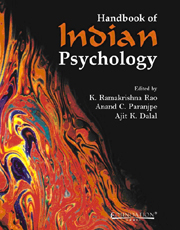Book contents
- Frontmatter
- Contents
- Contributing Authors
- Preface
- 01 Prologue: Introducing Indian Psychology
- 02 Indian Thought and Tradition: A Psychohistorical Perspective
- PART I SYSTEMS AND SCHOOLS
- 03 Jaina Psychology
- 04 The Foundations of Early Buddhist Psychology
- 05 Varieties of Cognition in Early Buddhism
- 06 A Buddhist Theory of Unconscious Mind (Ālaya-Vijñāna)
- 07 Indian Buddhist Theories of Persons
- 08 Buddhist Psychology: A Western Interpretation
- 09 Transpersonal Psychology in the Bhagavad-Gītā: Reflections on Consciousness, Meditation, Work and Love
- 10 Yoga Psychology: Theory and Application
- 11 Patañjali Yoga and Siddhis: Their Relevance to Parapsychological Theory and Research
- 12 Yoga Psychology and the, Sāṃkhyā Metaphysic
- 13 Psychology in the Advaita Vedānta
- 14 The Nyāya-Vaiśeṣika Theory of Perceiving the World of our Experience
- 15 Psychological Theories and Practices in Āyurveda
- PART II TOPICS AND THEMES
- PART III APPLICATIONS AND IMPLICATIONS
- Pronunciation and Transliteration of Sanskrit Alphabet
- Glossary
- Index
04 - The Foundations of Early Buddhist Psychology
from PART I - SYSTEMS AND SCHOOLS
Published online by Cambridge University Press: 26 October 2011
- Frontmatter
- Contents
- Contributing Authors
- Preface
- 01 Prologue: Introducing Indian Psychology
- 02 Indian Thought and Tradition: A Psychohistorical Perspective
- PART I SYSTEMS AND SCHOOLS
- 03 Jaina Psychology
- 04 The Foundations of Early Buddhist Psychology
- 05 Varieties of Cognition in Early Buddhism
- 06 A Buddhist Theory of Unconscious Mind (Ālaya-Vijñāna)
- 07 Indian Buddhist Theories of Persons
- 08 Buddhist Psychology: A Western Interpretation
- 09 Transpersonal Psychology in the Bhagavad-Gītā: Reflections on Consciousness, Meditation, Work and Love
- 10 Yoga Psychology: Theory and Application
- 11 Patañjali Yoga and Siddhis: Their Relevance to Parapsychological Theory and Research
- 12 Yoga Psychology and the, Sāṃkhyā Metaphysic
- 13 Psychology in the Advaita Vedānta
- 14 The Nyāya-Vaiśeṣika Theory of Perceiving the World of our Experience
- 15 Psychological Theories and Practices in Āyurveda
- PART II TOPICS AND THEMES
- PART III APPLICATIONS AND IMPLICATIONS
- Pronunciation and Transliteration of Sanskrit Alphabet
- Glossary
- Index
Summary
There are three terms that are used in the early discourses which can explain the fundamental aspects of the psychological speculations of the Buddha. They are the fundamental aspects because hundreds of other psychological concepts in the early discourses can be brought under one or the other of these three categories. These three categories thus explain the entirety of original Buddhist psychology. They are thought (citta), mind (mano) and consciousness (viññana). The Saṁyutta-nikāya contains two short discourses (2, 94–97) which outline the nature of these three psychological phenomena and the manner in which they should be treated in order to be free from the suffering associated with human life. They are also wrongly interpreted in order to justify some form of metaphysical idealism. Considering the enormous significance of these two discourses, we propose to begin our discussion with a complete translation of the first of these.
Thus has been heard by me. Once the Fortunate One was living in Sāavatthi, at Jeta's garden, in the monastery of Anāthapiṇḍika. Then the Fortunate One addressed the monks: “Monks!” “Yes, Fortunate One,” responded the monks. The Fortunate One said thus:
“Monks, an individualist without learning (assutavā puthujjano) should be disgusted with, dispassionate toward and released from this body made of the four great elements.
What is the reason for this? Monks, seen is the accumulation, also the dissipation, also the grasping and also the abandoning of this body made of the four great elements. Therefore, therein an individualist without learning should be disgusted with, dispassionate toward and released from this body made of the four great elements.
[…]
- Type
- Chapter
- Information
- Handbook of Indian Psychology , pp. 73 - 84Publisher: Foundation BooksPrint publication year: 2008

